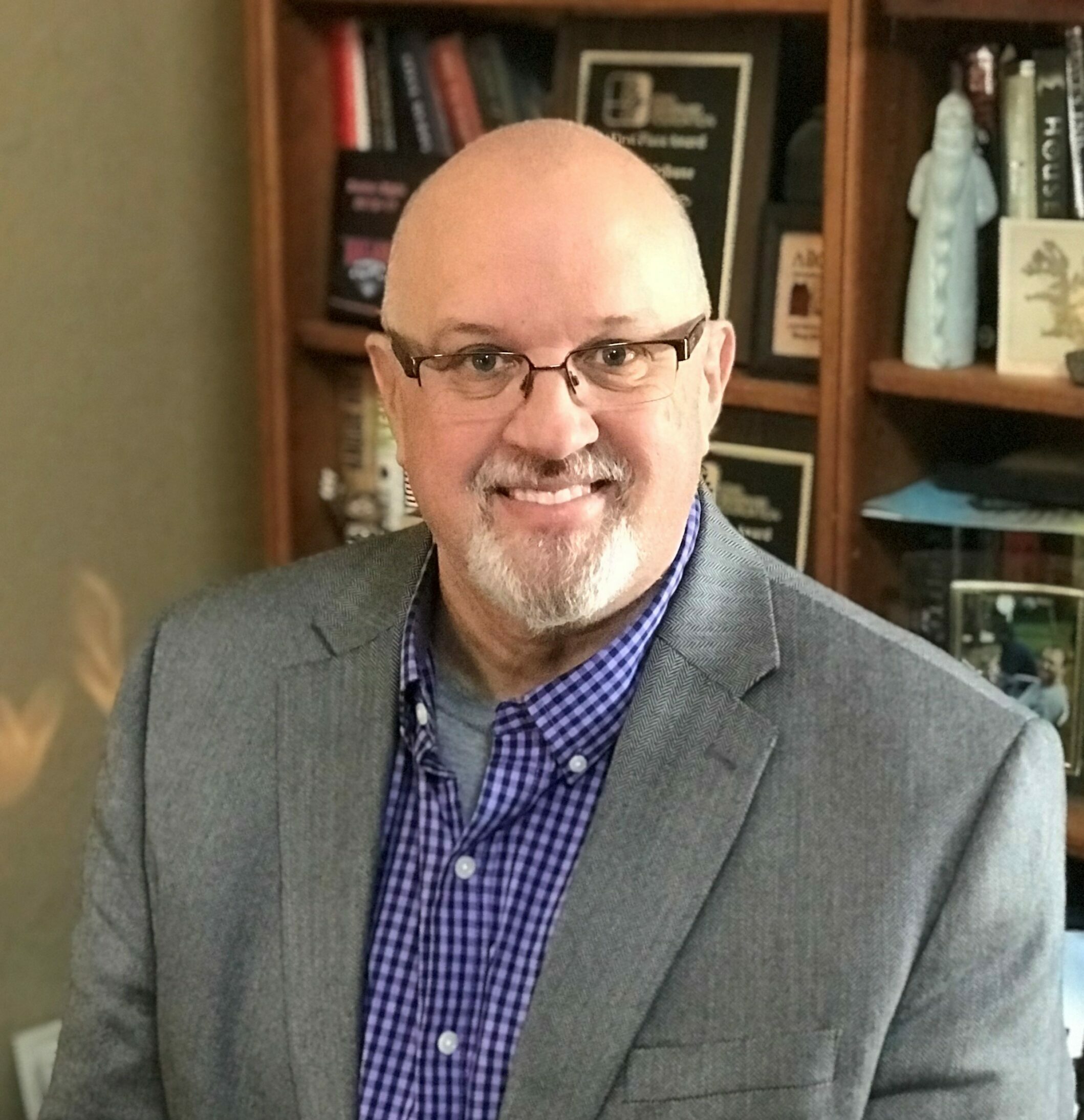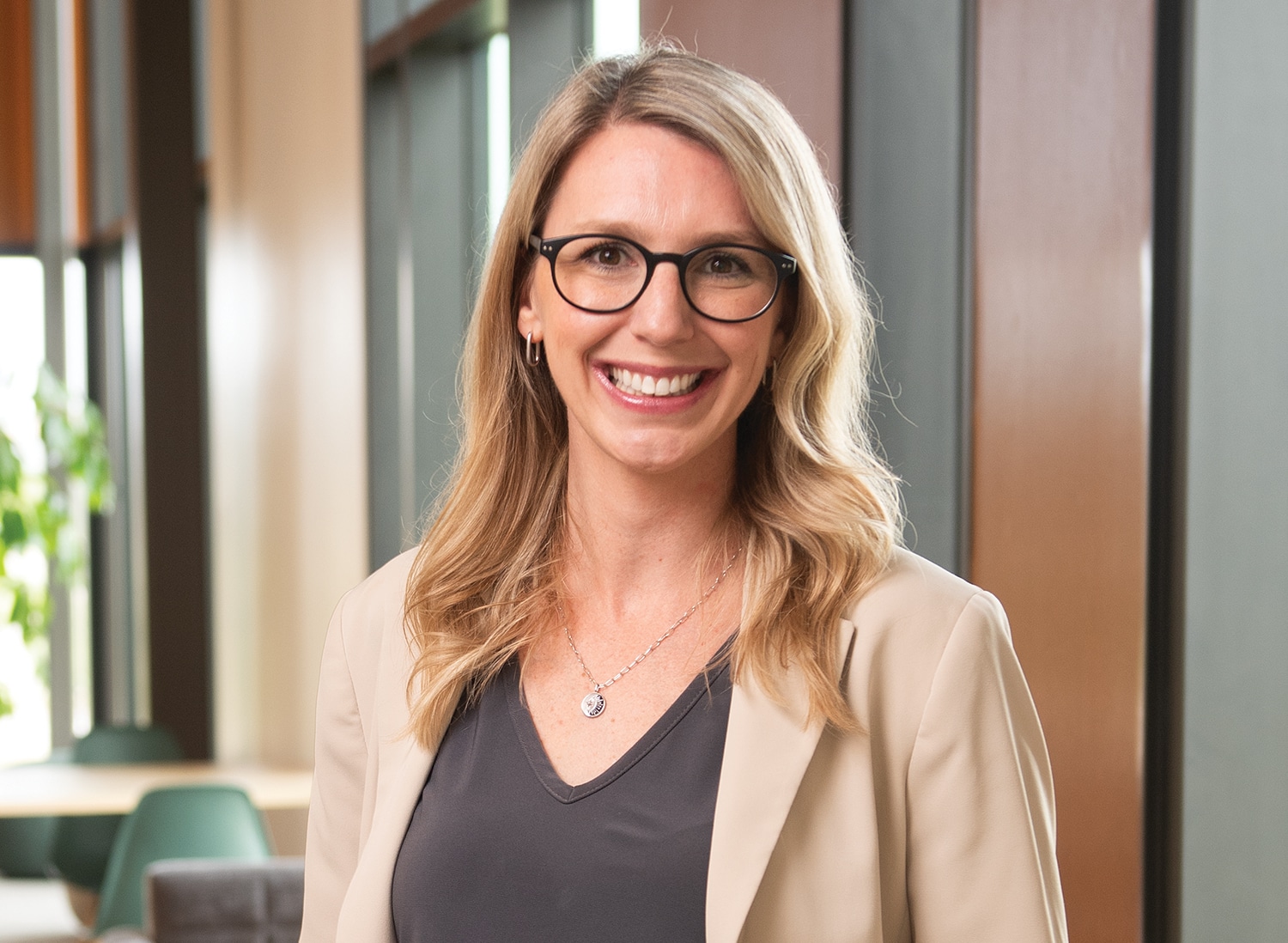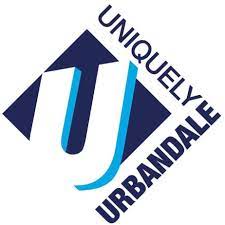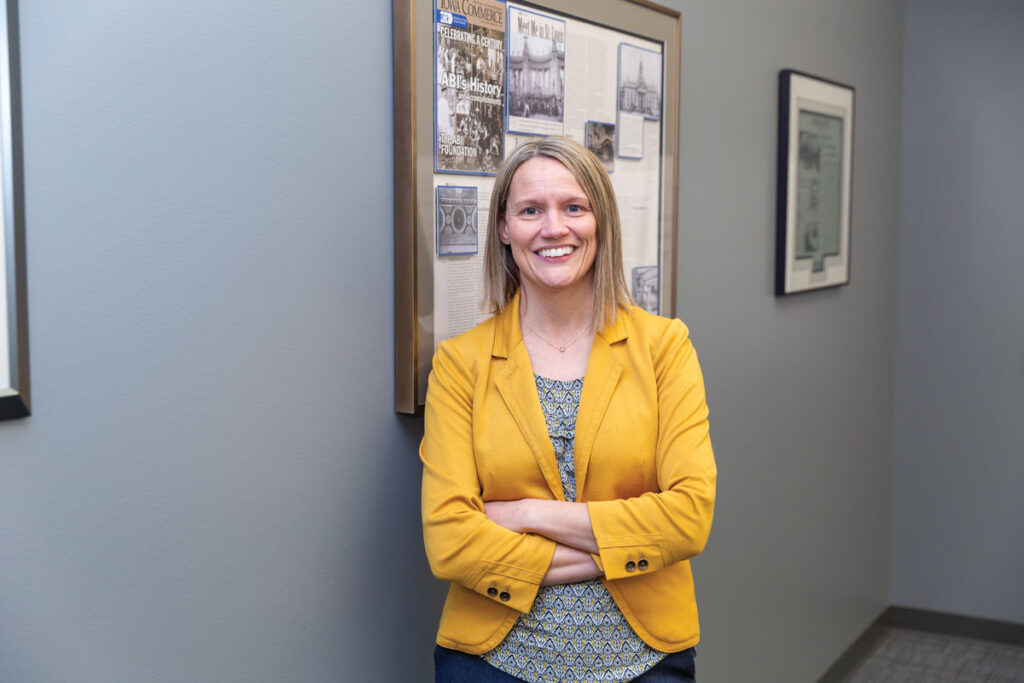A Closer Look: Katie Lord
Economic development director, city of Grimes

After spending several years serving as business and community development manager with MidAmerican Energy Co., Katie Lord joined the city of Grimes as its first economic development director on May 1.
Prior to her position with MidAmerican, Lord served as an economic development specialist with the city of Urbandale. Lord grew up in Hillsboro, Ore., where her dad was a city building official. She recalls going to the office with him on the weekends and watching him roll out plans and drawings. That’s where her passion for local government began, Lord said.
Not only has Lord followed in her father’s footsteps by working in local government, she’s married to Derek Lord, the economic development director in Ankeny, with whom she shares her excitement and passion for helping communities grow.
The Business Record sat down with Katie Lord recently to learn more about her new role and the goals she has for the fast-growing city of Grimes.
This Q&A has been lightly edited for clarity and brevity.
What is it about economic development that drives you?
I think each position you hold before the next teaches you something. There’s technical skills and knowledge you gain, but you really learn, what do I want to do longer term? You really have to do some self-reflection on what do I love about this work? For me, it’s the community aspect. I am happiest when I am with people. I’m happiest when I’m sharing something and when I’m either learning or teaching someone else something. I think all that comes together to have this focus on building spaces where people can live, where they can invest their dollars, where they can vacation, where they can come to sporting events. I love to think about how do we bring all these different perspectives together, partners together, people tougher to create something where people want to spend their time? And community is at the core of what economic development is.
What goals do you have for Grimes in your new role?
The city of Grimes invested heavily in the GrimesPlex and around that is 100 or 200 acres of land for commercial, residential and retail development. From the city’s perspective, they really have an interest in how that area develops to support their capital investment [in the GrimesPlex]. It’s not only to attract visitors or meet the needs of those visitors that come for the GrimesPlex but it’s important that everything there works for the residents. Because when the teams pack up and go away and the ball fields are quiet, it’s the residents and the region that will support those businesses. So one goal is thinking through how to strategically develop that area and how to do that really well. Another goal is identifying ways to elevate the profile of our community. Grimes has a great story to tell. What are stories that resonate with people, whether it be residents, community leaders, regional leaders or developers? What makes sense for them for how we can bring new investment into the community?
Is there a particular opportunity that excites you?
I think all of them, to be totally honest. I really enjoy redevelopment, and the Governors District is a really unique place and I think a lot of people in Grimes love the small-town feel. That’s an area that excites me because it has that storytelling element of the past. I get excited about industrial development and bringing in large employers and the benefit that can bring to the community, and I also like thinking about individual small businesses and how they can serve the community and keep that unique feel. There are things I love about all different types of development, and that’s what really was attractive about Grimes.
What’s a challenge Grimes faces?
Economic development is a long-term game. Wins are not realized weekly. They’re not realized monthly. It’s annual, if you’re lucky. There are good years and not-so-good years. So really, when you look at economic development, you kind of measure it in the past decade. What happened? Where were we able to influence it? It’s easy for folks to forget the redevelopment of Valley Junction took years and years and years. The Jordan Creek development took years and years and years. So it’s easy for folks to focus on the now and not think about the long term, and I think that’s where my position comes in as being strategic and having creative ideas that we’ll see implemented maybe 15 years from now, hopefully sooner. But there are a lot of macroeconomic forces that are outside of our control. So, it’s taking a holistic approach to economic development to balance some of that and make sure we’re able to take advantage of opportunities when they present themselves. Similarly, Central Iowa is doing a phenomenal job as far as development and building community … and that makes all of us have to be more strategic and it raises the bar for everyone. I think that’s excellent. That will only continue to build out a better metro. The bar is higher, and we all have to continue to rise to the challenge.
What have you learned from your dad and his experience as a city building official?
My dad exposed me to public service and, over time, taught me what it meant. To him, and to me, public service is about helping other people be successful. It’s finding ways to be creative within a regulatory environment and helping someone achieve their vision and dreams, which ultimately benefits your community. It’s this idea that has always attracted me to public service, and to this day is why I do what I do.
What’s it like to be married to another economic developer in what many might consider to be a competing community?
I think it’s only positive. We have such a shared love of our work that it does seep over into our personal life. A discussion around exciting projects in the metro that have been announced and people are building support for, or unique initiatives that others might not think about as dinnertime talk, but for us, it’s these things that really do matter and really impact our world. Where it’s most fun is when we’re traveling together and we’re outside of Central Iowa, usually outside the state, and we’re able to be reactive and we’re allowed to talk about unique spaces that we see that we’d love to bring to our communities. We’re always looking at things like accessibility and biking and transportation trends, unique housing developments and how cities are laid out. It’s usually very small, and I think that’s powerful because a lot of what we do in economic development is we might plant a seed for a small idea and maybe it gets legs and goes somewhere, but it’s really small things. I think you take examples from any community you’re in. There’s always little interesting things but it’s having the eye for, and it helps to have a partner that points things out like, “Hey did you see that?” or “look at that unique sidewalk design.” We talk about all different things that people don’t notice but can help boost our work and be more creative.
Is there a book you have recently read? If so, why would you recommend it?
“Atomic Habits” by James Clear. It’s a really easy book to read. It’s very digestible. I just love it. It has a few core principles and one quote that I wrote on the wall in my workout room and I have it on a sticky note in my office, and I just think it’s so true. It’s “You do not rise to the level of your goals, but you fall to the level of your systems.” And as you think about how we go through daily life, if we aren’t set up for success, we’ll forget about the goals. You get so busy working and doing the things you’re trying to do that, yeah, the goal might be out there. You might see it. If you’re really strategic and intentional you might have it up on a wall or somewhere where you see it every day, but you are just doing your thing. You’re doing the work. And if you approach that work, if you’re not set up for success with the tools, with your resources, with your relationships, your strategic partners, your knowledge level on what you’re trying to achieve, you’ll never get there. That book really just ingrained in me a thought about what are the daily habits I have? How do those daily habits inform the work that I do and the end product I am working towards and what does that look like?
At a glance
Age: 36
Family: Married, three children
Education: Bachelor of Arts in economics and business from Cornell College, Mount Vernon, Iowa; Master’s of Science in urban and regional planning from the University of Iowa.
Activities: Spending time with family, traveling, exercising, baking and sharing food, and exploring parks and coffee shops.
Contact: KLord@grimesiowa.gov

Michael Crumb
Michael Crumb is a senior staff writer at Business Record. He covers real estate and development and transportation.











